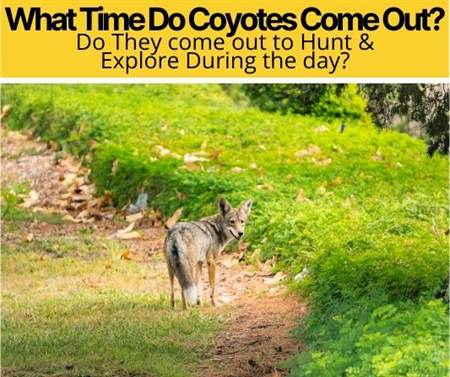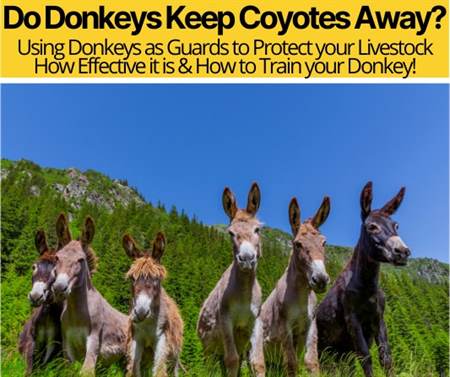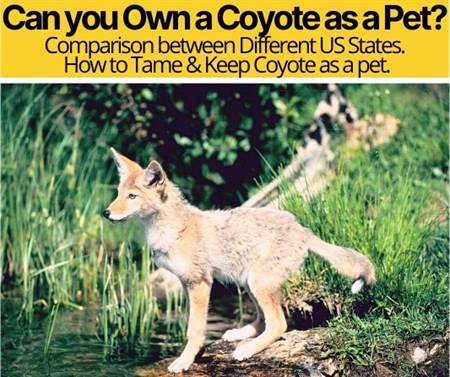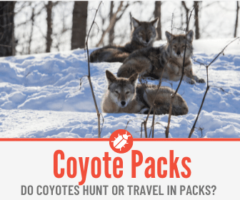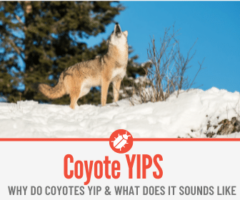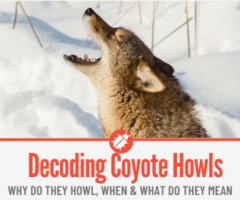 This is something many people ask themselves, especially when they hear that a coyote has been spotted in their neighbourhood.
This is something many people ask themselves, especially when they hear that a coyote has been spotted in their neighbourhood.
So, are They actually scared of humans or it’s best to avoid one when you see it? Can they be Dangerous to Humans?
We have answered this and other commonly asked questions on this subject and hope it will put your mind at ease about these wonderfully wild canines.
Are Coyotes Scared Of Humans?
Wild Coyotes certainly are scared of humans, however the biggest problem is that human naivety in feeding them has led to coyotes not being scared of humans anymore in urban areas. Then you get the scenario of the fearless coyote getting a little too close for comfort. So if people wise up and don’t interfere with nature and let coyotes stay afraid of us, the less they will become a danger.
In the natural environment coyotes would, without a doubt, be afraid of humans but the more interaction they have with humans, the more the fear diminishes – without fear, the balance will shift and the coyotes will no longer be afraid of humans.
Are Coyotes Dangerous to Humans
In theory, no, coyotes are not dangerous to humans. Coyotes are very curious creatures who love nothing more than observing their surroundings, especially new ones, but they do actually prefer to steer clear of humans. These creatures are very similar to foxes in their behaviour.
If you hear coyotes howling, you have nothing to worry about as well.
Indeed there have been reported incidents of attacks on humans or domestic pets but these are very unusual events and it seems really unfair to judge the poor old coyote on these reports alone.
As with all wild animals, if the coyote feels threatened or has young nearby, this may make them act more aggressively, but in the main coyotes are not dangerous to humans.
Also read: What Time Do Coyotes Come Out?

What To Do If You See A Coyote While Hiking
The most important message of all has to be DO NOT FEED THEM! This also includes making sure you don’t leave any waste behind. The same applies if you see one in your home environment – make sure waste garbage is secured properly in a solid container.
Coyotes are actually omnivores so they eat fruit and vegetables as well as meat.
So if you have a vegetable garden or even trees that drop fruit, it would be a good idea to make sure you keep these tidy and coyote-proof if there are reports of coyotes in your area. Even compost heaps can be a source of food so just think about keeping ALL food sources secured – including your pet food bowls!
Coyotes are wild animals and contrary to what an average person may believe, they are better off being left that way!
The minute you start to feed a wild animal you start a process of gradual dependency, which is totally the wrong thing to do because this will eventually lead to fearful humans who may then want to see the coyotes got rid of – even though they were the ones who screwed the whole natural order up in the first place!
- NEVER turn and run from a coyote. The same goes for a domesticated dog! It is deeply embedded within these creature’s core natural instincts to chase something that runs away from them as they see it as pray! Any of you who own a pet dog will know this as your dog will love a good old game of chase if you start running away from them and with a domesticated animal it’s usually more for fun purposes, but with a wild animal it’s a whole different ball game! So just try sitting quietly and observing it for a while if you see a coyote while hiking and try not to panic. It will probably be a bit curious but then walk away.
- If there is the possibility of coyotes being in the area you are hiking and you are afraid you may encounter one, it would be wise for you to carry something with you which will make a loud a noise – no, NOT A GUN! – something like a whistle or even an old soda can with some stones inside which you can shake. Do not approach it but just stand firm and stay calm and see what it does. It should gradually retreat but if it doesn’t and starts to exhibit aggressive behaviour, look directly at it and make a lot of noise. Do not scream but you can shout and wave your arms around and the coyote should start to retreat away from you. If this doesn’t work you can throw stones but please do not throw them directly at the coyote – aim for just next to it. Remember, he hasn’t done anything to you, it is just your fear taking over and he has every right to be on this planet too!
- If you have a pet on the loose with you, make sure you either pick it up or put it on a leash as this could otherwise be perceived as a threat to the coyote, and although it is most likely that it will run away, if it has its own pups close by it could make it act in an unpredictable manner. It is most likely that your dog will spot or smell the coyote before you see it and he/she is bound to go crazy, barking and showing signs of aggression towards the coyote because he/she are doing their best to protect you, their beloved owner, so be responsible and get your dog under control in a quick but calm manner.

What Can Coyotes Do to Humans
As mentioned above, it is extremely unlikely for a coyote to do ANYTHING to a human, but as with all wild animals, if they are cornered, provoked or shown unnecessary aggression, they could act unpredictably and may attack.
This could result in a nasty bite, but once again if humans just treated wild animals with a bit more respect and educated themselves more about said animal, there is no reason why this should ever happen. However generally coyotes will steer clear from you, also did you knew that nowadays there are some people that are trying to domesticate coyotes as pets ?
Why Are Coyotes Scared of Humans
Well, to a coyote, we are generally a lot bigger, a different species with completely different living habits and we smell different. All animals use their senses and instincts to determine whether there is a possible threat, to find pray and to protect themselves.
In nature, size really does matter! For example Donkeys are Used to Guard livestock from Coyotes, It is generally the first and most obvious indicator of who is the boss! A smaller animal in general will always be fearful of a larger animal and as adult humans are quite a lot larger than a coyote, that’s generally why coyotes are afraid of humans.
Will A Pack of Coyotes Attack A Human
Although coyotes have families around them, they tend to go off on their own, or as a pair, to find food. The whole family will have a territory that they all range and that territory can cover a distance of up to 10 square kilometres. So firstly, you are very unlikely to see a whole bunch of these creatures together at one time, but even if you did, they do not see humans as pray, so just stay calm and try to enjoy observing this wonderful piece of the wild that you have been lucky enough to stumble upon.
Continue Reading: Are Packs of Coyotes Dangerous
How Do You Befriend A Coyote
A nice short answer to this one – YOU DON’T!!! These are wild animals and should be respected and left to live that way without human interference!
How Many Humans Have Been Attacked By Coyotes
The number of reported attacks on humans by coyotes stood at 142 as at 2015. Equate this to a population of 357 million on North America (including Canada) that gives us a 0.00003% chance of this happening. So that should make you feel a whole lot better about these curious little canines!
Related Questions.
Does Human Urine Repel Coyotes
In theory – yes. As coyotes prefer not to be around humans, they tend to make their dens in wild places or parks and woodland. Unlike foxes, you are not likely to find them having their family under your garden shed!
So the trick of peeing around your shed to get rid of foxes doesn’t really work the same for coyotes. I am sure that if you were in a wilder place and happened to repeatedly pee right by a coyote den, the coyote would be a little perturbed and it could result in making the family move on, but as these are wilder than foxes, it’s just really unlikely that this set of circumstances would arise.
How Do You Know If You Have Coyotes Around
Most often, there will be notifications or general knowledge about them being present in a neighbourhood. But other indications of having coyotes around can be if you hear howling – mostly at night, but not unheard of in the daytime. Another clue is in the poo!
It is quite different to dog poo because coyotes eat a wild diet and it will quite often contain bits of fur, hair and bone and can appear to be like a rope. Compared to their domesticated relative, the dog, it’s quite different as a dog eats a domesticated diet. Also, you would start to see animal carcasses from rats and rabbits to sheep or goats as all of these can be easy pray for a coyote.
As we always like to remind you, ALL creatures on this earth have a right to be here, so educate yourself, show them respect and we can all live happily together without incident.

